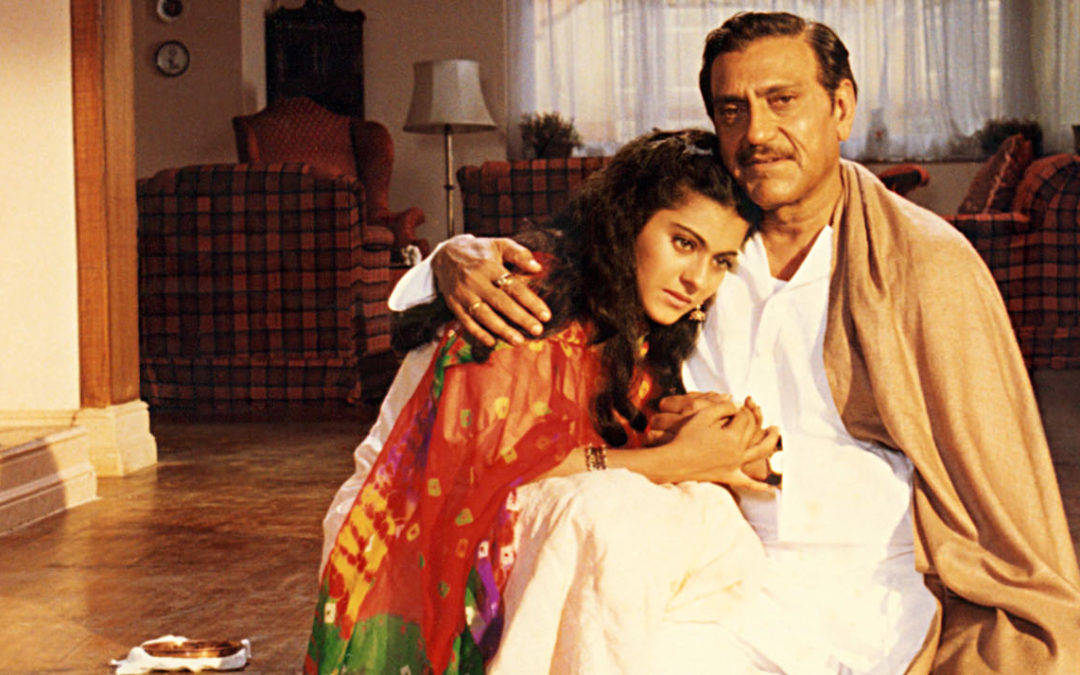Very recently I had the absolute pleasure of watching Dilwale Dulhaniya Le Jayenge, on the big screen. I was 9 years old when it released and despite many pleadings only got to see it on a VHS tape even as the DDLJ mania struck everyone in school.
Whatever one may say about their flatscreen, 72 inch surround sound system there is a joy to watching films in a cinema hall that cannot be replicated. Films are the most magical on the big screen and this Sunday I had the magical experience with one of my favourite films. And while it was wonderful three hours, the more memorable part of the week was having two genuinely great conversations about the film with two great film buffs which finally pushed me into writing this article.
Whatever one may say about their flatscreen, 72 inch surround sound system there is a joy to watching films in a cinema hall that cannot be replicated. Films are the most magical on the big screen and this Sunday I had the magical experience with one of my favourite films. And while it was wonderful three hours, the more memorable part of the week was having two genuinely great conversations about the film with two great film buffs which finally pushed me into writing this article.
I have always loved the film and the reasons have always changed with every new viewing. And possibly that is the reason that it stands out as a memorable cinematic event in Hindi film history. Because if you loved, liked or disliked the film whenever you saw it as a young person, it would be difficult that you have the exact same opinions about the film even now. That is, if you make the effort if watching it again.
As a teenager I loved the first half. I loved the songs. I loved Shah Rukh Khan’s charming Raj. I loved the idea of touring Europe on a train. All this was new and my reasons were predictably superficial. I was a 9 year old. Since that day, I have had multiple viewings of the film as my mother would worryingly confirm. And I have always, in every viewing found the film much more nuanced than earlier. The film’s unprecedented success is possibly because of this very reason. There is something you will find to connect with or enjoy, whoever you may be.
The whole film could have been placed in London but it works so beautifully because of the shift in the surroundings after intermission. We are first allowed to see Europe, London through the eyes of confused non-resident Indians struggling with their ‘Hindustaniness’ and then we finally see them in their Hindustan, still questioning their beliefs and values. There is a sense of comfort and clarity that this shift to India brings to the story. It clears the air of quasi-modernity and makes it very clear to the audience who these characters are. We see Simran’s mother Lajwanti breaking down in a brilliantly done monologue by Farida Jalal. This woman may have been mixing Tang and dancing on pop tunes in her London kitchen but back in punjab she makes it very clear that her life has been that of huge compromises because of her gender. And we finally see Simran learning to accept her Patriarchal set-up and deciding to make her first big compromise too.
The film was one of the first and somehow still remains the very few films that actually speaks at length about Indian immigrants who settle in western countries. Yes there have been others, but they follow a very cookie-cut pattern, with the righteous protagonists being real ‘Indians’ instead of talking about the complexities of living in a multi-cultural set-up that are big cities, especially in the western countries. Especially for first generation immigrants.
In this film, we have two different men who came to UK with their families from Punjab but with completely different ideologies. Raj’s father Dharamvir Malhotra turned himself into a modern business mogul and very comfortable with his western surroundings and traditional roots. But it is the picture perfect depiction of a gas-station shop-owner Baldev Singh Chaudhary (by Amrish Puri) that cuts it really close. Puri plays a well written character, a fish out of the well, someone who is willing to shift to the western world for economic betterment of his family but does not still accept his surroundings as home despite 20 years there. His struggle is what many first generation immigrants feel, sometimes in the process remaining far more traditional. They are stuck in the time they left their homes, even as their country transforms continuously.
And what about their children? This film was after-all the love story of Raj and Simran and their trial and tribulations. And of course it is, especially so post intermission when you see this couple struggle for family approval, a thing that is almost never depicted in Hindi cinema. But before we move on to their love story, let’s talk about Simran Singh. The highly repressed yet feisty daughter of Baldev Singh Chaudhary. This film speaks of female emancipation at many levels. While Simran’s “Tumhe sharam nahi aati ladki ke saamne sharaab peete hue?” seems dated today, the concept behind it still holds water. It’s a conversation about freedom and how much should be allocated to a woman, a decision that is not hers but that taken by a man – a father, husband, even brother.
Simran was brought up in London, she wore western clothes, danced to western music with her sister, dreamt of love and dating but is very much aware of the kind of reality that she lives in. She may as well have been living in a small town in India, possibly she would be under less stress because her father wouldn’t be preoccupied with the concept of ‘keeping the Indian culture alive.’ With a possible wedding with a complete stranger, which she doesn’t yet have the courage to oppose her father about, imagine her plight. Her one month in Europe is the first time Simran is free for the first time in her life. And in her mind will be, in all her life. She is free to do as she pleases, wear what she wants, even drink too much and sing a song and then finally free to be asked the most important question of the film – “You are going to marry a complete stranger. And you are happy with this decision?” What does Simran really see in Raj? He is charming yes, played by an effervescent SRK who would make a wooden board melt. But he is also the first person in the whole film who forces Simran to use her own judgement.
Let’s talk about Raj. With no mother, and a non-traditional upbringing, he is very comfortable and confident mix of traditional and western morals, just like his father. His lines do get mangled once a while, which is very nicely shown in the scene where he misbehaves with Baldev at his store. He is not without flaws. If anything he is a little overzealous, douchey charmer whose blinded optimism can get on one’s nerves. ‘How can he be so confident in his plans to win over Simran’s father?’ is possibly one of the biggest criticisms of his character and the film. But perhaps it is not his brilliant plan, but his unfaltering dedication to it that worked in his favour finally. Look at the end. It’s basically a staring match between Baldev Singh and Raj. If Raj would have walked inside the train and sat quietly, Baldev would have never had let go of Simran’s hand and spoken the memorable line – “Jaa Simran jaa, jee le apni zindagi.”
At many levels, it is the women in the film who finally struggle to make things possible, even as they wait for the final patriarchal approval. Simran rants in front of her father announcing her desire to run away with Raj, her mother Lajwanti drags her to the Railway Station disobeying her husband’s wishes, they are accompanied by the younger daughter and even Kuljeet’s sister. These women quietly make a very clear statement to the powerful father figure by their very presence. And the final straw is when Simran runs after the train, as it starts to move. Chaudhary must have had realised at some level the fault in his stubbornness by then, but did not have the courage to give in yet. The final push comes from pleading puppy dog stare from Raj which turns into a staring contest that Chaudhary finally concedes happily. So even if Raj may have taken his Dulhaniya but it was not a single-handed victory, but an uplifting moment in the film that celebrates family, courage, love and craziness together. Possibly why it remains one of the most memorable film endings in the history of Hindi Cinema.
We all at some level look for parental approval however modern the society may get. And the film holds good, and will for many decades for this very fact. Because it combines the important and unshakeable elements of a traditional society with the eccentricity and joy of youth to give a love story of two very strong characters, played by superstars like they don’t make anymore.
I wanted to end the article with a good hearted invitation to everyone to watch the film, possibly with an open mind and an open heart. Even if you have seen it, watch it again…





















It is an uncomfortable monologue, but i feel like that is the point of it. It kind of talks about the most well known injustice happening with women over decades, even today. And the fact that her mother is accepting of it as injustice is a big deal, because many just call it normal. Its a big bonding moment for the mother-daughter because that is the first realistic conversation they have, where the mother does not try to brush off the problems under the carpet with her optimism.
That's very well written. I always found Farida jalal's monologue a bit uncomfortable and never understood Simian and her choices. Love the movie nevertheless!